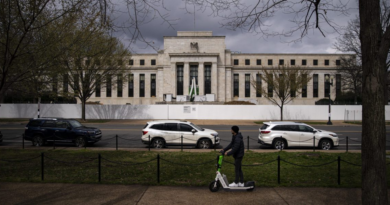Armed with new execs, dLocal rebounds from a short seller attack in a big way
Uruguayan fintech company dLocal saw its stock surge by over 30% on Wednesday on the news that the payments outfit had tapped former Mercado Libre CFO Pedro Arnt as its new co-CEO.
Shares closed up nearly 32% at $20.45, after climbing as high as $24.22 earlier in the day, giving the company a $6 billion valuation.
That surge was on top of an August 15 spike after the company beat earnings estimates in releasing its second-quarter financials. Impressively, dLocal reported revenue of $161 million, up 59% year-over-year and 17% quarter-over-quarter. The company also saw a large jump in profits, reporting gross profit of $70.8 million in the second quarter of 2023, up 43% year-over-year compared to $49.6 million in the second quarter of 2022 and up 14% compared to $61.8 million in the first quarter of 2023.
Looking ahead, dLocal reaffirmed its guidance for the year of revenue between $620 million and $640 million and adjusted EBITDA between $200 million and $220 million.
Founded in 2016, dLocal connects global enterprise merchants with “billions” of emerging market consumers in over 40 countries across Asia-Pacific, the Middle East, Latin America and Africa. Hundreds of global merchants, including e-commerce retailers, SaaS companies, online travel providers and marketplaces use dLocal to accept local payment methods. They also use its platform to issue payments to their contractors, agents and sellers. Some of dLocal’s customers have included Amazon, Booking.com, Dropbox, GoDaddy, Mailchimp, Microsoft, Spotify, TripAdvisor, Uber and Zara.
Earlier this summer, TechCrunch caught up with dLocal co-founder Sergio Fogel, who rejoined the company in June as co-president and chief strategy officer, per a Bloomberg report, “as part of a push to help regain investor confidence and stabilize the company’s stock after it tumbled following a probe in Argentina and a short seller attack.”
Fogel was also among a group of shareholders who had purchased in the aggregate amount of about $160 million of the company’s Class A common shares in open market transactions — $100 million by General Atlantic and about $60 million by Fogel, dLocal co-founder Andres Bzurovski and dLocal chairman Eduardo Azar.
Below is the result of the interview with Fogel, edited for clarity and brevity.
TC: The last time I covered dLocal was in 2021. At the time, the company had raised $150 million at a $5 billion valuation. What has happened since then?
SF: A lot has happened. We went public at $21. The stock jumped immediately to $31 and continued upward till $60+. We crushed the numbers: TPV up 4x+, revenues up 3x+, adjusted EBITDA up 3x+. Then the stock declined with the overall market and was hit hard by a short seller report.
You went public a couple of years ago — obviously before the market took a turn — and we haven’t seen a lot of companies go public since. Do you feel you all made the right decision at that time?
Absolutely. For a payments company, reputation is key, especially for large merchants that we serve. Being a public company that is regulated in many markets gives our customers the confidence that their money is safe and that we comply with the strictest regulations. It has been a bumpy ride, but it was the right decision.
You recently rejoined the company after having stepped away for some time. Why did you come back?
I have been away, but I have never been far. Seba, our CEO, asked me for help, as managing a public company with 800 employees, a presence in 45 geographies and growing at a breakneck pace was taking a big toll on him, and he needed help. He could have hired someone, but we already share a high level of trust, and I know the business well. Of course, I could not say no, and honestly, I was missing the thrill.
When I last covered dLocal, you all described yourselves as a cross-border payments company. How would you describe what dLocal does today besides handling payments across much of Latin America, as well as parts of Africa and Asia, correct?
We expanded the scope a bit. We help the largest internet companies in the world move money in emerging markets. If a large company wants to accept cross-border payments, we’re there for them. If they want to pay their gig workers, we’ll help them. If they want to process payments locally, we will also help them. But we will never handle local payment processing for a local company — that market is well-served. We are uniquely positioned to serve a merchant in multiple geographies, with a high level of security and reliability, with just one agreement, one integration, one reporting platform — what we call “One dLocal.” It may sound trivial, but no other company offers one solution that covers so many different emerging markets.
Our fastest growing geography is actually Africa. We are still growing in all geographies but Africa is the fastest growing and one that we are very excited about because it’s such an underserved market.
What are you attributing the company’s recent revenue growth to?
Being a public company, we can only comment on guidance in the earnings calls and other appropriate forums, so I cannot say anything beyond that. However, I can expand on our revenue growth drivers.
Our first driver of growth is our sales team, who bring in more merchants. Merchants typically take some time to integrate and ramp up, so the growth that we see today is in large part attributed to merchants we signed last year.
A second driver of growth is geography. Our existing customers normally start in one or two countries, and then they expand to more and more countries. But this is dynamic, because we also expand our geographic coverage in response to their plans.
A third driver of growth is new products. For example, this year we launched an invoicing product that allows customers to accept payments without a technical integration.
And the fourth driver is that our customers are growing fast in our markets. While growth in some developed markets may be stalling, emerging markets continue to grow very quickly. These are young populations, with a growing middle class, eager to spend. We are indexed to the growth of our merchants in these geographies.
We are just scratching the surface. On a typical month, 40 million consumers pay through us. That may sound like a lot — until you realize we serve a market of 4 billion people, of which half are connected. We are serving just 1% of that population.
Are you looking to expand geographically anymore? Outside of the regions you’re already serving? How many employees do you have?
We will continue to expand geographically, albeit at a slower pace. But we will continue to be focused on the challenging markets; that is our DNA. We will not expand into the U.S. or Europe, as those markets are well-served and we have no value to add. We still have a lot to grow in the regions we are already in.
There were allegations of fraud late last year that the company denied. What exactly happened?
A short seller issued a report claiming that the company is a fraud and that we had used merchant funds to distribute dividends. Of course, before publishing the report, they took a short position, so they stood to profit from the price decline. The claims were absurd. The company is audited, and under a very high level of scrutiny. We run an external “Safeguarding of Customer Funds” review every year. Still, the audit committee decided to run an external investigation to provide all stakeholders — investors, customers, partners — reassurance about the business. The investigation found no basis for any of the claims.
What’s ahead product-wise? Anything new?
We are very focused on executing our plan. But, like everybody else, we are very excited by the possibilities that AI opens to all businesses and are exploring the area.
Obviously the fintech world has had its ups and downs over the past couple of years. What are your thoughts overall on the payments space?
There is a lot of hype around FedNow, but in my view, the really exciting developments in payments are happening in emerging markets. I would claim that Pix is the most successful initiative launched by any government in any field, anywhere in the world. Pix has taken Brazil by storm. You can pay anyone with Pix, from the largest department store to the smallest lemonade stand. Even beggars on the street take it. Every Latin American country is imitating it. Then you have UPI in India, e-wallets throughout Asia and mobile money, which is well established across Africa.
And this innovation wave is not over. In Brazil, we’ll soon see Pix with installments, open receivables and the Digital Real.
Want more fintech news in your inbox? Sign up for The Interchange here.


